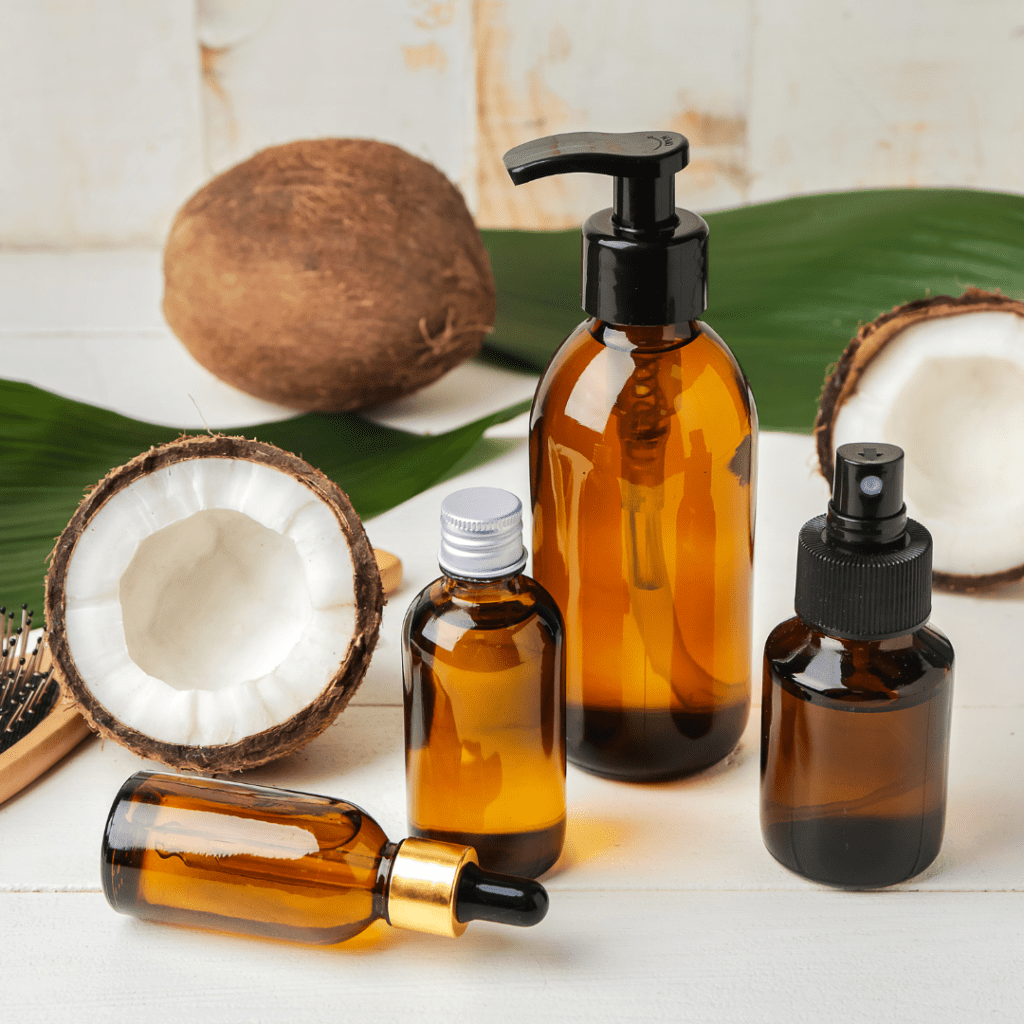Coconut oil can be detrimental for your hair and scalp. Wow… that’s such an unpopular opinion. Is it a scam or just another click-bite heading? Let’s take a deeper dive and discuss why coconut oil, this Holy Grail beauty product, could be bad for your hair and scalp.

For thousands of years, coconut oil has held a special place in Eastern beauty practices. But in the last decade, it’s gained immense popularity in the West, becoming the go-to for various beauty needs. This versatile oil is celebrated for its ability to soothe the scalp, hydrate, and fortify hair cuticles, leaving hair smoother, softer, and stronger. There’s even talk about its potential contribution to healthy hair growth.
This multitasking gem has earned celebrity endorsements from the likes of Kourtney Kardashian and Miranda Kerr, prompting numerous brands to incorporate it into their beauty and haircare lines. However, despite its widespread acclaim, recent concerns about its impact on certain skin types have sparked discussions about its effects on hair health.
As coconut oil gains traction in Western beauty culture, it’s essential to heed expert advice regarding its usage, especially considering recent debates about its effects on specific skin types and its potential impact on hair.
Coconut Oil Makes Your Hair Dry
According to dermatologists, coconut oil’s knack for penetrating deeply into the hair shaft and its potential to minimize protein loss make it a favorite.
This is because it’s rich in lauric acid (a fatty acid), which penetrates the hair shaft and coats each strand, locking the moisture in as well as making your hair water repellent. In short this means that whatever the weather, humidity isn’t going to ruin your hairstyle. Frizz doesn’t stand a chance against the coconut oil force field you’ve created around your hair.

However, this very quality can backfire for some hair types, causing unexpected dryness. When coconut oil fills the hair cuticle, it occupies the space within the strands. Consequently, during hair wetting, there’s less room for water absorption, leaving the hair less saturated than it would be without coconut oil. This phenomenon can lead to the unexpected outcome of dryness in certain hair types.
Coconut oil actually stops treatments from penetrating the hair shaft.

That being said coconut oil should not be on your beauty menu, if you have low porosity hair. Low porosity hair has tightly closed cuticles that repel water. Coconut oil will make the situation even worse making your strand lifeless and extremely dry.
On the other hand, coconut oil can be extremely beneficial for those with high porosity. It’s great for very porous hair because it prevents water from rushing into the strands too fast causing excessive swelling, which is bad because it puts undue stress on the cuticle by lifting it up
Pro Tip: do not use coconut oil as a solo treatment due to its controversial nature.
Coconut Oil Triggers Dandruff
As it’s been already mentioned, coconut oil is rich in lauric acid. Lauric acid also can boast of great antimicrobial properties which have been reported to benefit the scalp microbiome.

But the flip side of the coin is that the type of the yeast that causes dandruff, known as Malassezia, actually feeds off lauric acid. Never apply coconut oil solo on your scalp.
Also coconut oil has the potential to clog pores and create a build up on your scalp. This is why those with finer hair or already oily scalps may find their hair looks or feels greasy as coconut oil can weigh the hair down leaving it to look limp and lank.
In the world of hair care, coconut oil stands as a polarizing figure. While it boasts an impressive array of benefits, it’s crucial to acknowledge its limitations and potential drawbacks. The unique penetration of coconut oil, lauded for its ability to deeply nourish and hydrate hair, can also present challenges for certain hair types. From potential dryness to exacerbating dandruff concerns, its impact varies widely among individuals.
Therefore, understanding your hair’s specific needs and characteristics becomes pivotal when incorporating coconut oil into your routine. While it’s a celebrated ingredient for many, being mindful of its potential adverse effects ensures a tailored approach to hair care, allowing for optimal results without unexpected setbacks. Always remember, what works wonders for one may not necessarily be the best choice for another.
Don’t forget that sharing is caring. Share this post with someone who is desperate to tame coconut oil. Stay tuned for the best DIY coconut oil treatments post


